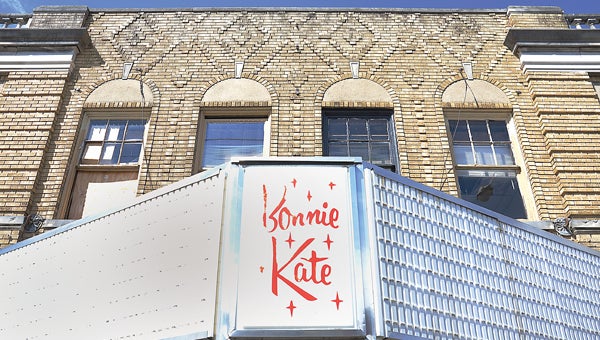Council approves agreement to purchase Bonnie Kate with foundation funding; photos needed to guide restoration
Published 9:50 am Friday, May 13, 2016

Star Photo/Rebekah Price
After the donation of the Bonnie Kate Theater to the City of Elizabethton is complete, the Elizabethton/Carter County Community Foundation will continue fundraising efforts to restore the theater to its historic state.
John Huber, the man who has spearheaded fundraising efforts to save the Bonnie Kate Theater, said the Elizabethton City Council decision Thursday night signifies the end of phase I — acquisition of the theater — and the beginning of phase II — restoration to its original stature.
Councilmen unanimously approved an agreement to work with the East Tennessee Foundation (ETF), which has raised more than $100,000 for the purchase of the theater in the name of the City of Elizabethton. Members of the Elizabethton/Carter County Community Foundation (ECCF), a branch of ETF, will now apply for grants and petition private donors to fund its restoration.
“I think this is a step in the right direction in terms of revitalizing our downtown and continuing to make Elizabethton a great destination for families, tourists and the people who value the history of this theater,” said Kris Yarlett, ECCF chairman.
City Manager Jerome Kitchens specified that this agreement is not considered the purchase, but it does imply that the council will vote to approve a resolution in the near future for the purchase of the theater.
The agreement states the City of Elizabethton will purchase the Bonnie Kate at a maximum price of $111,700, entirely with ECCF funding. It also states the Council will approve funding for the parking lot in the amount of $25, 800. Kitchens said this would be a benefit to downtown shoppers and attendees to events.
Huber said funds for the building purchase were contributed by a number of private donors including Carter County Bank, Security Federal Bank, Elizabethton Federal Savings Bank, and several anonymous donors.
“We’re now going to solicit grants, but we need the community’s support,” Huber said, adding ARC, historic grants and state funds could be available.
The agreement states that if sufficient progress is not made toward the goal to improve the building, including repair or replacing the roof and hopeful availability to community for use, the city will have the right to sell the property and return funds to the foundation and to donors.
Kitchens explained to councilmen that ECCF cannot own property, but as a foundation, it can acquire grant funding and tax benefits. He said it would have been ideal if a private owner had purchased the building in order to keep it on the tax roll, but that this did not happen at the auction or thereafter.
Huber said currently, he and a few other investors own the building, but will donate it to the city upon Council approval. Councilman Bob Cable asked if the bank took a loss on the sale, and Huber said yes, in the amount of $70,000.
Councilman Richard Tester asked who would be responsible for day-to-day management of the building, decisions on leasing, and funding for that position. Huber said he cannot at this moment answer that, but that the thought is the foundation will fund it. Kitchens said Huber has offered to manage remodeling efforts, and sale of the building if necessary.
“The city as landlord is not unique,” Kitchens said. “We’ve talked about having a board in charge of it.”
Cable said he was not against the agreement, but that he hated to see the city take on another liability.
“If it has reached the point where it is dead in the water, the city has the right to sell it,” Huber said.
Kitchens said the city could not hold a building that was “falling down,” and that the windows out front needed to be repaired to be up to code. He said the foundation has patched the roof as well. Huber said they have a prospective tenant which is a local business owner interested in expanding business and occupying both front facing spaces of the theater. The foundation would fund installation of a separate electric meter for this tenant, he said, adding the tenant is interested in opening shop as early as August.
“The potential is a high upside and not a lot on the downside, but it won’t be remodeled overnight,” Kitchens said.
Councilman Jeff Treadway echoed this after clarifying terms of the agreement, saying, “There’s a big upside to this — if we can pull this off — to have cultural events and performances. Part of our vision is to make Elizabethton a very livable community for people that may not work here but want to come back here, and that’s the kind of thing I think could do it.”
Huber said their vision is to restore the theater to its state prior to 1960, when it was one large theater. He said the lighting and sound will have to be repaired, and although the projector is still there, it is outdated and “of no use.”
Huber said they need photos to guide the restoration, as they have very few to reference for the historical style and features. Elizabethton/Carter County Public Library Archivist Joe Penza said they have none dating between 1920 and 1950, and that even if people want to keep the originals, they can digitally scan photos for the archives and for use during restoration.
“If they donate photos, I can guarantee they will be preserved,” said Penza.
The foundation’s vision, Huber said, is of a performing arts center that can showcase live music, dance, holiday and company events and movies. Jonesborough Theater and Paramount have done it, he said, adding he doesn’t see why they could not.
“It’s not 100 percent tied up perfectly in a red ribbon, but I think it’s the best chance we have to preserve it,” said Kitchens.



